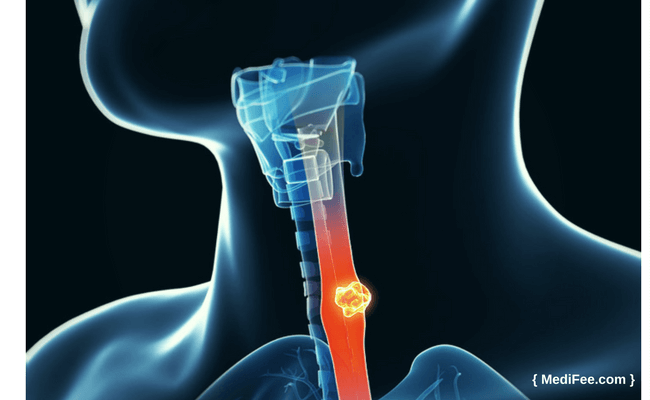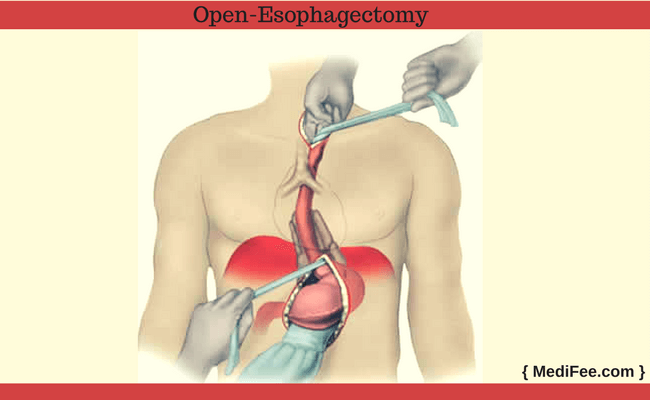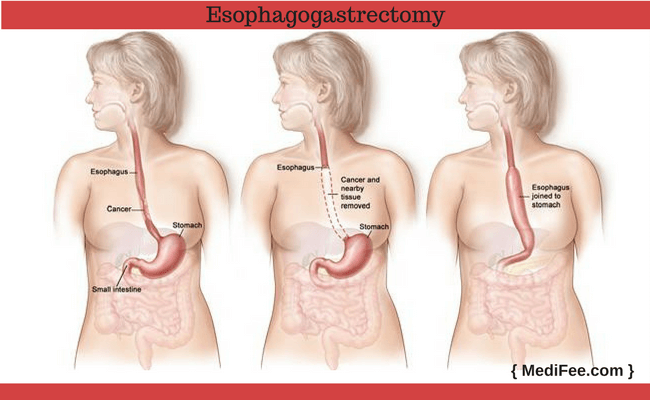Esophageal Cancer Surgery
Listed below is the step by step procedure of esophageal cancer surgery:
- What is Esophageal Cancer Surgery?
- Why is Esophageal Cancer Surgery Required?
- Pre-operative Preparation
- Day Before Surgery
- Procedure Day
- Methods/Techniques of Esophageal Cancer Surgery
- Post Procedure
- Risks and Complications
- FAQs
What is Esophageal Cancer Surgery?
Esophageal cancer surgery involves removal of cancerous cells from the esophagus. Based on the stages and severity of esophageal cancer, type of treatment is decided.
There are various stages of esophageal cancer based on its level of spread to the tissues. At stage 0, cancerous cells can be seen only inside the inner lining of esophagus. This is also known as high-grade dysplasia. When inner layers of the esophagus are attacked by cancerous cells, it is considered as stage 1 esophageal cancer.

In stage 2, the spread of cancer has reached the outer layers of the esophagus. There are chances of cancer spread into the lymph nodes in this case. Here, spread of cancer has reached beyond the esophagus to the lymph node and other tissues nearby. In stage 4 esophageal cancer, metastasis of cancer takes place and it reaches to other body parts. Based on these stages, doctors decide the type of surgery required for the patient.
Why is Esophageal Cancer Surgery Required?
For treating the cancer of esophagus, surgery is a preferred approach. Oncologists can suggest the type of surgery based on the stage of esophageal cancer. Usually surgical treatment is recommended for stage I and stage II esophageal cancer. Later-stage esophageal cancer treatment can include combination of radiation and chemotherapy. These combination treatments are used for shrinking of the tumor prior to surgery. Upon confirmation of cancer in the esophagus, surrounding lymph nodes are also removed during the operation.
Pre-operative Preparation
After confirmation of esophageal cancer, basic details about the operation process are informed to the patients. It mainly includes information regarding tests to be performed prior to the surgery and precautions to be taken. A surgeon will inform the patient about:
- Type of operation
- Benefits of operation
- The possible risks associated
- Chances of recovery
Prior to the surgery, fitness of the patient needs to be tested. Some tests need to be performed right before the surgery. These tests are:
- Breathing tests to ensure normal lung functioning
- ECG
- Chest X-ray
- Blood test for general health
- Weight
- Pulse
- Temperature
Increase in nutrients and energy few days before surgery helps in maintaining healthy state of the patient.
Discussed below are the diagnostic tests needed to be performed prior to surgery for confirming extent of cancer spread into the esophagus and surrounding area.
- Computed tomography (CT or CAT) scan:
For getting detailed images of the esophagus, CT scan is carried out. More than diagnosis, it is carried out to find the exact location of cancer cells in the esophagus and their spread into the surrounding tissues.
- Magnetic resonance imaging (MRI) scan:
Soft tissues in the body are scanned using MRI scans similar to CT scan. Results obtained via MRI are useful in deciding the line of treatment which can be either radiation or surgery.
- Positron emission tomography (PET) scan:
A PET scan is considered as the most accurate mode to ascertain spread of cancer. This accuracy aids doctors to define strategies for treatment or surgery.
Day Before Surgery
All reports of blood tests and imaging tests etc. need to be kept ready to be referred during surgery whenever required. Other instructions regarding medications will be given by the surgeon. Esophageal cancer surgery is the one which is not easy to recover from. The patient requires to be as healthy as possible prior to the surgery. Some patients may feel anxious as it is a cancer surgery. They may need counseling prior to the surgical process. This helps them feel less anxious.
Procedure Day
Good hygiene is required to be maintained prior to the surgery. No food consumption is allowed few hours prior to the surgery. A dietitian helps the patient in understanding effect of surgery on diet. Some patients need a feeding tube. This tube is inserted in their stomach to ensure proper nutrition before the surgery.
Methods/Techniques of Esophageal Cancer Surgery
Surgical procedures for treatment of esophageal cancer are described below.
Open Esophagectomy

Complete esophagus or a part of it is removed during an open esophagectomy by the surgeon. It depends on the stage of cancer present. The surgical process for it involves making incisions in the chest and abdomen or neck. In some patients, incisions are made in all these parts of the body. Usually based on the location of the cancer, incisions are made.
Minimally Invasive Esophagectomy
A minimally invasive esophagectomy is performed over open esophagectomy when area affected by esophageal cancer is smaller in size. This process involves making of few small size cuts instead of two bigger cuts. A laparoscope is used by a surgeon during this surgery for removal of esophagus. A laparoscope is an instrument which includes a long tube having a small camera at one end. Camera attached in the laparoscope helps in guiding the surgeon to view the images clearly. After removal of complete esophagus or a part of it, connection of remaining esophagus is done by the surgeon. If lower part of esophagus is removed completely, the part of esophagus left will be surgically connected to the stomach.
Esophagogastrectomy

Here, removal of the esophagus with cancer, surrounding lymph nodes and upper part of the stomach is carried out. After the removal process, remaining part of stomach and esophagus are connected with each other. Before connecting the esophagus to the stomach, a surgeon may replace the part of esophagus (removed previously) with a part of large intestine. This is known as a colonic interposition.
Endoscopic Mucosal Resection (EMR)
An endoscopic mucosal resection is carried out for the removal of early stage esophageal cancer. It is a less invasive process. It can be used as a diagnostic process in some cases. A thin tube called an endoscope is inserted into the throat during this process. For removal of tumor, endoscope has instruments at the end of it. Some procedures that are used for helping in EMR are mentioned below
- Upper endoscopy
An upper endoscopy involves insertion of an endoscope into the throat, esophagus and stomach. This is carried out after giving sedatives to the patients. A camera attached to the monitor helps in showing images of abnormal tissue areas present in the esophageal wall. Using endoscope, special instruments can be used for collection of abnormal tissue samples. These samples then sent to the laboratory for further testing.
- Endoscopic ultrasound
Usually, this test is carried out along with upper endoscopy. It uses sound waves for imaging the body parts. The size and extent of spread of cancer in the esophagus is determined using an endoscopic ultrasound. A probe at the end of an endoscope with the ability to produce sound waves is used in this process. This probe is inserted into the throat and then to the esophagus. It helps in detection of the cancerous tissues closely.
- Upper endoscopy
Palliative Surgery
Surgeons perform palliative surgery procedures to reduce symptoms of esophageal cancer. Some procedures adopted in palliative surgery are mentioned below.
- Radiofrequency ablation (RFA)
For treatment of dysphagia (swallowing difficulty), RFA technique is recommended. Here, a balloon with small electrodes is passed into the esophageal area using an endoscope. After inflating the balloon, electrodes come into contact with the esophageal lining. Electronic current is passed afterwards which helps in killing the cancerous cells.
- Laser ablation
In laser ablation method, a laser beam is focused on the cancerous area using endoscope. It helps in destroying the cancerous tissue. A laser called neodymium: yttrium-aluminum-garnet (Nd:YAG) is used here. It helps in reducing swallowing difficulties in esophageal cancer patients.
- Plasma coagulation
Argon gas is used in this technique and from the tip of an instrument called endoscope, a high-voltage spark is delivered. This spark makes the gas reach at higher temperatures and then targets the cancerous cells. This method is especially used for unblocking the esophagus and helps reduce swallowing troubles.
- Electrocoagulation (electrofulguration)
For relieving esophageal blockage, this method is applied. During electrocoagulation, a probe is passed through the esophagus using an endoscope for burning the tumor with electric current.
- Esophageal stent
A device called stent is placed into the esophagus using endoscopy. It is a self-expandable tube like device which holds the esophagus open.
Stents are made up of metal or mesh material. In some cases they are made up of plastic as well. The use of stent helps providing relief in patients for swallowing the food items.
- Radiofrequency ablation (RFA)
Post Procedure
Recovery at Hospital
Post-surgery medications and diet needs to be followed at hospital. Proper care needs to be taken and any excessive pain needs to be reported to the surgeons.
It is relaxing and also sometimes a stressful feeling post surgery in case of esophageal cancer patients. Along with relief, there can be a fear of recurrence of cancer in the mind of patients. There are many cancer patients living with uncertainty about the recurrence of cancer. In some patients of esophageal cancer, complete recovery is never achieved. In such cases, chemotherapy and radiation therapy are recommended on regular basis post surgery.
Recovery at Home
Patients of esophageal cancer need to take precautionary measures at home post-surgery. This includes consuming healthy diet and avoiding alcohol, tobacco and smoking. Moral support of close family members is also essential for early recovery in case of patients with esophageal cancer.
Follow up
Follow up is recommended post-surgery treatment. It includes regular appointments with surgeons to ensure complete removal of cancerous cells. It can be done with imaging tests, such as X-rays, CT scan and MRI scan. For prevention of cancer recurrence, follow up methods are very important.
Risks and Complications
Listed below are the complications post surgery in case of esophageal cancer patients.
- Dyspnea
- Fatigue
- Sleeping difficulties
- Problems with gastroesophageal reflux
Side Effects
Since esophageal cancer surgeries are complex in nature, following side effects can be observed.
- Loss of blood
- Blood clots
- Stroke
- Heart attack
- Infection at the site of incision
Side effects of esophagectomy procedures are listed below.
- Intestinal or lung damage
- Stomach injury
- Acid reflux
- Disruption of sutures at the esophagus and stomach connection point.
Side effects of radiations used in esophageal cancer surgery
- Nausea
- Vomiting
- Fatigue
- Changes in the skin
- Mouth dryness
- Thick saliva
- Shortness of breath as result of lung damage due to radiations
FAQs
- Is it necessary to undergo a surgery for all stages of esophageal cancers?
It has been reported in the studies that, for stage IV esophageal cancer, chemotherapy is preferred; however, with most stages of cancer, individual patient's requirements may vary. The extent of spread of cancer is a prime factor while deciding a surgical treatment.
- How many chemotherapy treatments are expected by an esophageal cancer patient?
The amount and time period of chemotherapy required in case of esophageal cancer patients depends on the stage of esophageal cancer and overall health of the patient.
- How much recovery time is required after esophageal cancer surgery?
Usually recovery after surgery is depend on the health of the patient. Five to ten days period of hospitalization is required in general for recovery of patients who have undergone surgery of esophageal cancer.
More information related to Esophageal Cancer surgery
Best Gastro surgeons in India
Top Gastroenterology hospitals in India

